Leadership for Beginning Practice: Reflection on Nursing Leadership Management
VerifiedAdded on 2022/11/22
|10
|2703
|119
AI Summary
This article reflects on the nursing leadership management and issues regarding the development of a professional nurse. It discusses the importance of leadership competence, emotional intelligence, critical thinking, and dedication to excellence and professional socialisation. The article also highlights the importance of the NMBA standards of practice for the registered nurse and the development of transformational leadership skills.
Contribute Materials
Your contribution can guide someone’s learning journey. Share your
documents today.
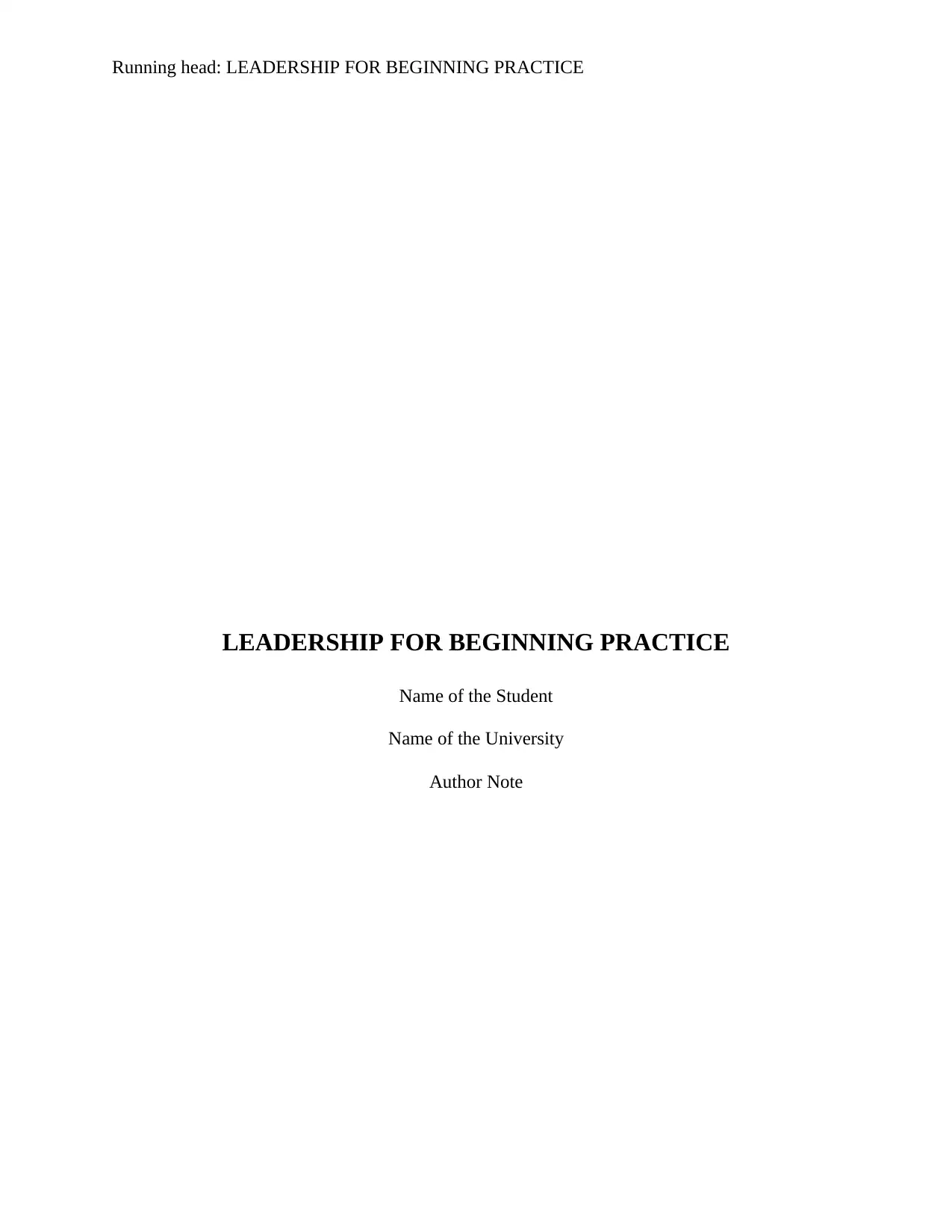
Running head: LEADERSHIP FOR BEGINNING PRACTICE
LEADERSHIP FOR BEGINNING PRACTICE
Name of the Student
Name of the University
Author Note
LEADERSHIP FOR BEGINNING PRACTICE
Name of the Student
Name of the University
Author Note
Secure Best Marks with AI Grader
Need help grading? Try our AI Grader for instant feedback on your assignments.
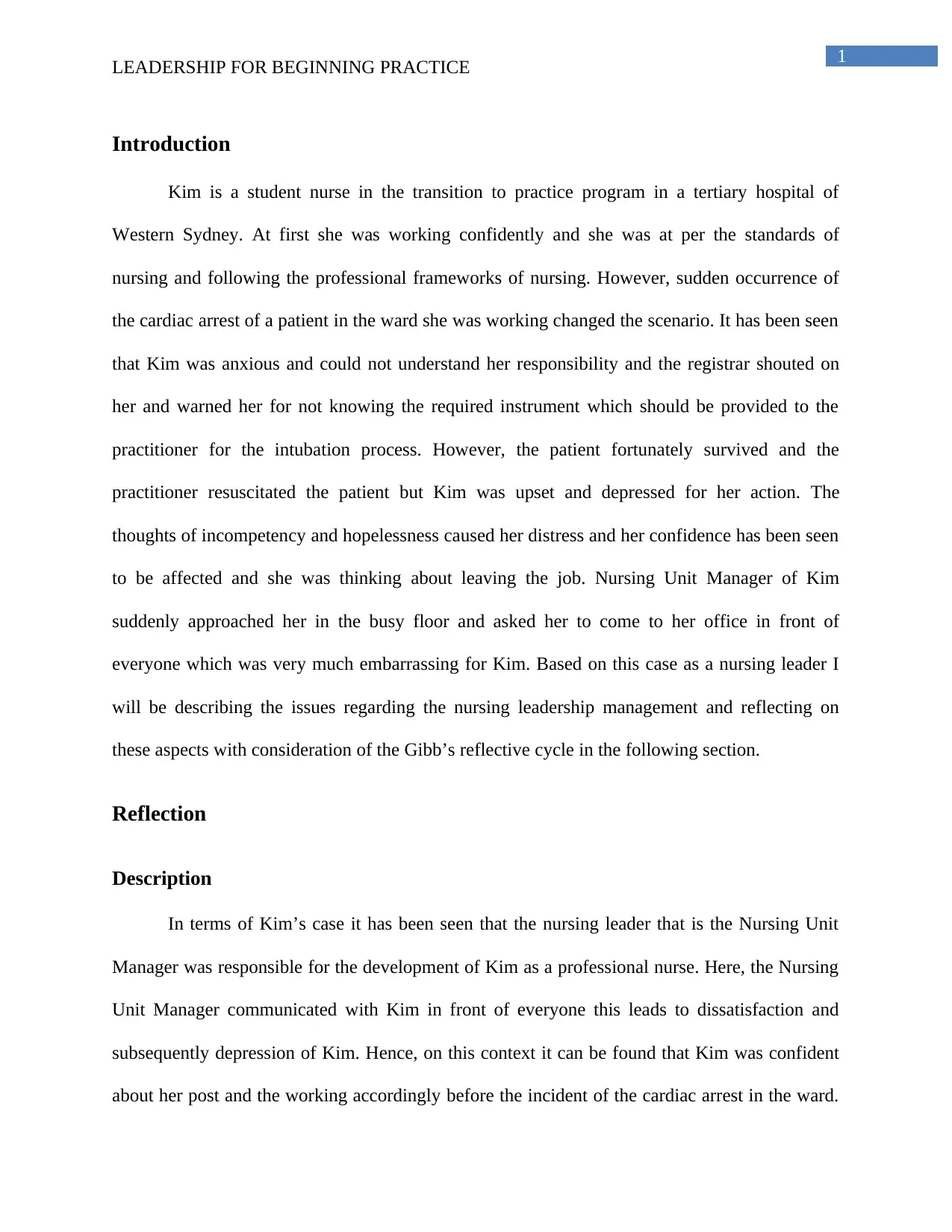
1
LEADERSHIP FOR BEGINNING PRACTICE
Introduction
Kim is a student nurse in the transition to practice program in a tertiary hospital of
Western Sydney. At first she was working confidently and she was at per the standards of
nursing and following the professional frameworks of nursing. However, sudden occurrence of
the cardiac arrest of a patient in the ward she was working changed the scenario. It has been seen
that Kim was anxious and could not understand her responsibility and the registrar shouted on
her and warned her for not knowing the required instrument which should be provided to the
practitioner for the intubation process. However, the patient fortunately survived and the
practitioner resuscitated the patient but Kim was upset and depressed for her action. The
thoughts of incompetency and hopelessness caused her distress and her confidence has been seen
to be affected and she was thinking about leaving the job. Nursing Unit Manager of Kim
suddenly approached her in the busy floor and asked her to come to her office in front of
everyone which was very much embarrassing for Kim. Based on this case as a nursing leader I
will be describing the issues regarding the nursing leadership management and reflecting on
these aspects with consideration of the Gibb’s reflective cycle in the following section.
Reflection
Description
In terms of Kim’s case it has been seen that the nursing leader that is the Nursing Unit
Manager was responsible for the development of Kim as a professional nurse. Here, the Nursing
Unit Manager communicated with Kim in front of everyone this leads to dissatisfaction and
subsequently depression of Kim. Hence, on this context it can be found that Kim was confident
about her post and the working accordingly before the incident of the cardiac arrest in the ward.
LEADERSHIP FOR BEGINNING PRACTICE
Introduction
Kim is a student nurse in the transition to practice program in a tertiary hospital of
Western Sydney. At first she was working confidently and she was at per the standards of
nursing and following the professional frameworks of nursing. However, sudden occurrence of
the cardiac arrest of a patient in the ward she was working changed the scenario. It has been seen
that Kim was anxious and could not understand her responsibility and the registrar shouted on
her and warned her for not knowing the required instrument which should be provided to the
practitioner for the intubation process. However, the patient fortunately survived and the
practitioner resuscitated the patient but Kim was upset and depressed for her action. The
thoughts of incompetency and hopelessness caused her distress and her confidence has been seen
to be affected and she was thinking about leaving the job. Nursing Unit Manager of Kim
suddenly approached her in the busy floor and asked her to come to her office in front of
everyone which was very much embarrassing for Kim. Based on this case as a nursing leader I
will be describing the issues regarding the nursing leadership management and reflecting on
these aspects with consideration of the Gibb’s reflective cycle in the following section.
Reflection
Description
In terms of Kim’s case it has been seen that the nursing leader that is the Nursing Unit
Manager was responsible for the development of Kim as a professional nurse. Here, the Nursing
Unit Manager communicated with Kim in front of everyone this leads to dissatisfaction and
subsequently depression of Kim. Hence, on this context it can be found that Kim was confident
about her post and the working accordingly before the incident of the cardiac arrest in the ward.
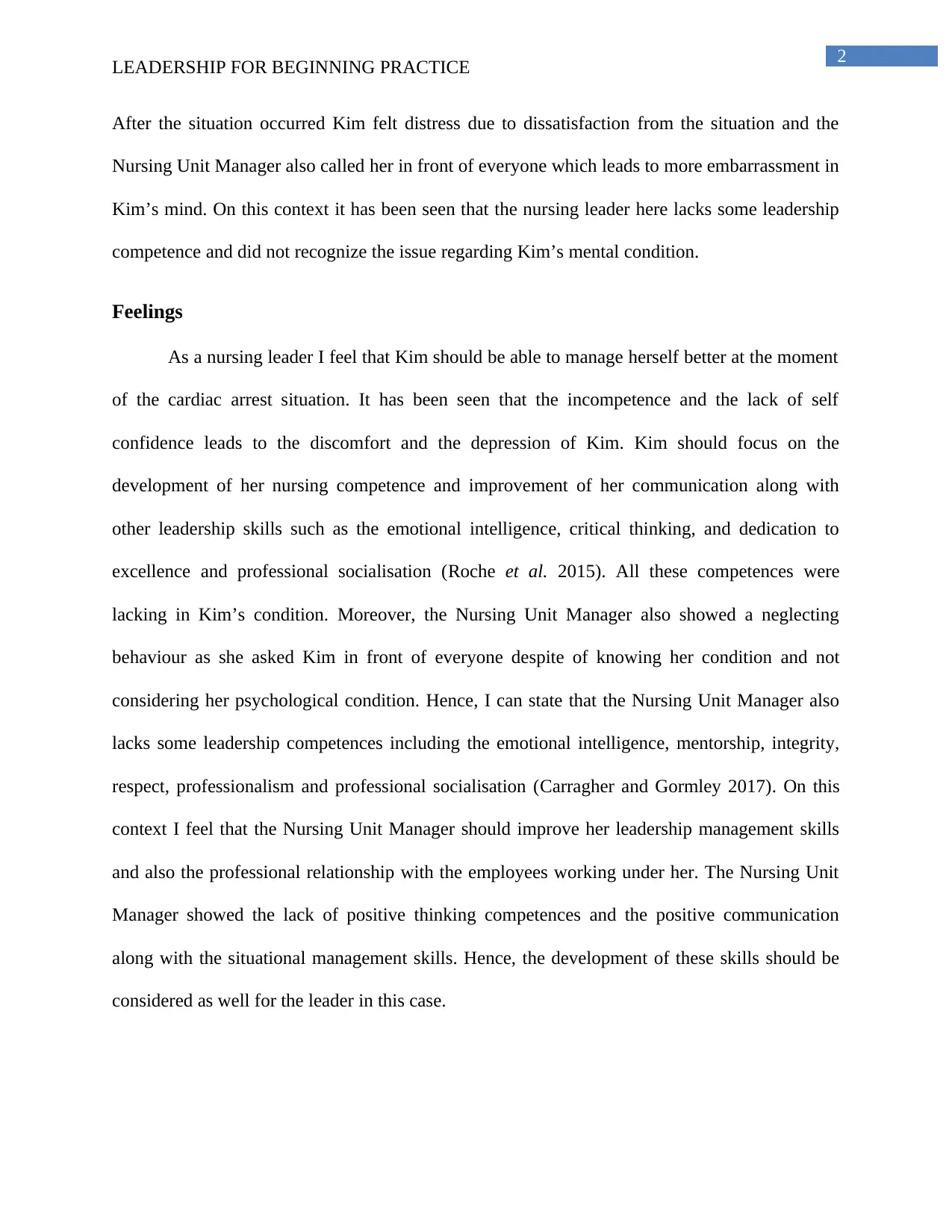
2
LEADERSHIP FOR BEGINNING PRACTICE
After the situation occurred Kim felt distress due to dissatisfaction from the situation and the
Nursing Unit Manager also called her in front of everyone which leads to more embarrassment in
Kim’s mind. On this context it has been seen that the nursing leader here lacks some leadership
competence and did not recognize the issue regarding Kim’s mental condition.
Feelings
As a nursing leader I feel that Kim should be able to manage herself better at the moment
of the cardiac arrest situation. It has been seen that the incompetence and the lack of self
confidence leads to the discomfort and the depression of Kim. Kim should focus on the
development of her nursing competence and improvement of her communication along with
other leadership skills such as the emotional intelligence, critical thinking, and dedication to
excellence and professional socialisation (Roche et al. 2015). All these competences were
lacking in Kim’s condition. Moreover, the Nursing Unit Manager also showed a neglecting
behaviour as she asked Kim in front of everyone despite of knowing her condition and not
considering her psychological condition. Hence, I can state that the Nursing Unit Manager also
lacks some leadership competences including the emotional intelligence, mentorship, integrity,
respect, professionalism and professional socialisation (Carragher and Gormley 2017). On this
context I feel that the Nursing Unit Manager should improve her leadership management skills
and also the professional relationship with the employees working under her. The Nursing Unit
Manager showed the lack of positive thinking competences and the positive communication
along with the situational management skills. Hence, the development of these skills should be
considered as well for the leader in this case.
LEADERSHIP FOR BEGINNING PRACTICE
After the situation occurred Kim felt distress due to dissatisfaction from the situation and the
Nursing Unit Manager also called her in front of everyone which leads to more embarrassment in
Kim’s mind. On this context it has been seen that the nursing leader here lacks some leadership
competence and did not recognize the issue regarding Kim’s mental condition.
Feelings
As a nursing leader I feel that Kim should be able to manage herself better at the moment
of the cardiac arrest situation. It has been seen that the incompetence and the lack of self
confidence leads to the discomfort and the depression of Kim. Kim should focus on the
development of her nursing competence and improvement of her communication along with
other leadership skills such as the emotional intelligence, critical thinking, and dedication to
excellence and professional socialisation (Roche et al. 2015). All these competences were
lacking in Kim’s condition. Moreover, the Nursing Unit Manager also showed a neglecting
behaviour as she asked Kim in front of everyone despite of knowing her condition and not
considering her psychological condition. Hence, I can state that the Nursing Unit Manager also
lacks some leadership competences including the emotional intelligence, mentorship, integrity,
respect, professionalism and professional socialisation (Carragher and Gormley 2017). On this
context I feel that the Nursing Unit Manager should improve her leadership management skills
and also the professional relationship with the employees working under her. The Nursing Unit
Manager showed the lack of positive thinking competences and the positive communication
along with the situational management skills. Hence, the development of these skills should be
considered as well for the leader in this case.
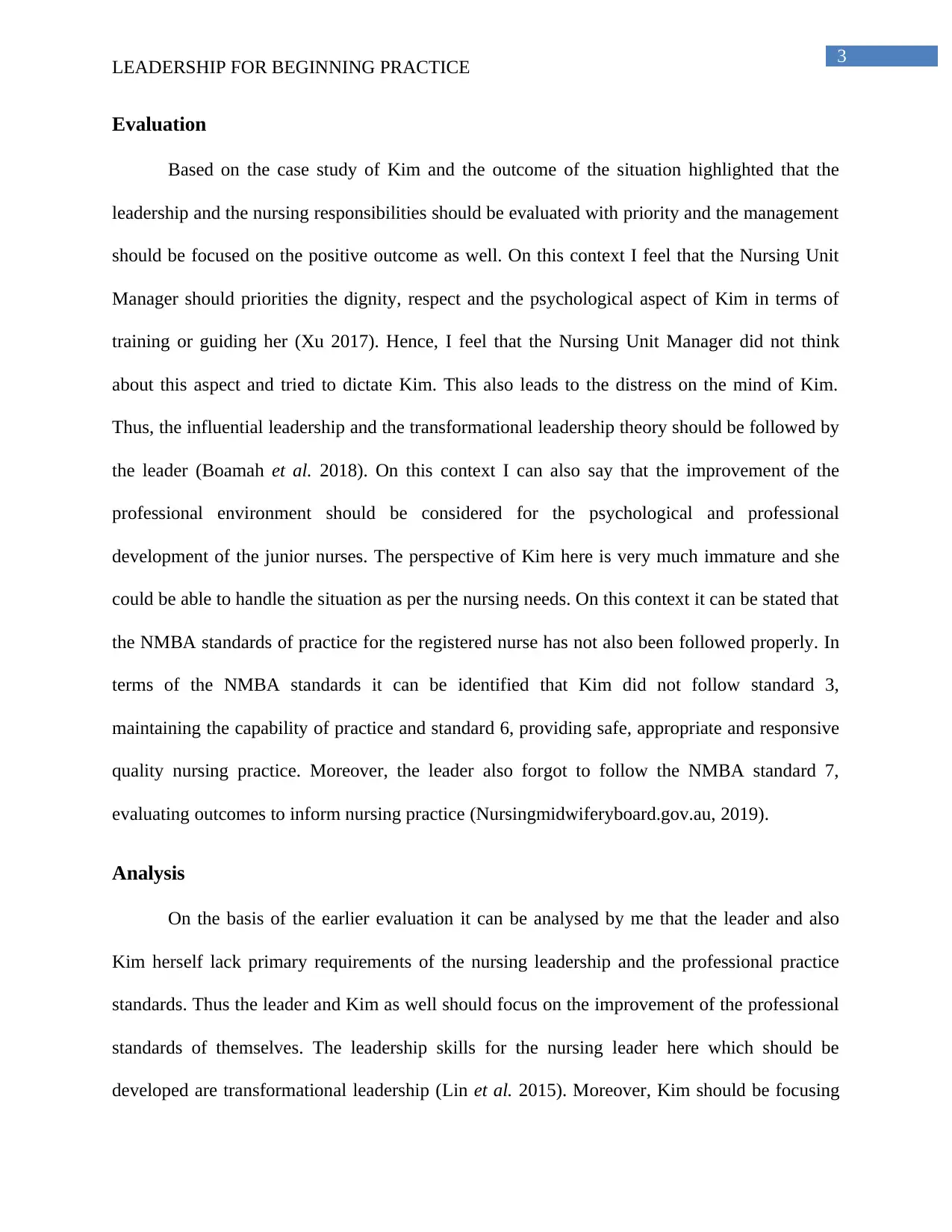
3
LEADERSHIP FOR BEGINNING PRACTICE
Evaluation
Based on the case study of Kim and the outcome of the situation highlighted that the
leadership and the nursing responsibilities should be evaluated with priority and the management
should be focused on the positive outcome as well. On this context I feel that the Nursing Unit
Manager should priorities the dignity, respect and the psychological aspect of Kim in terms of
training or guiding her (Xu 2017). Hence, I feel that the Nursing Unit Manager did not think
about this aspect and tried to dictate Kim. This also leads to the distress on the mind of Kim.
Thus, the influential leadership and the transformational leadership theory should be followed by
the leader (Boamah et al. 2018). On this context I can also say that the improvement of the
professional environment should be considered for the psychological and professional
development of the junior nurses. The perspective of Kim here is very much immature and she
could be able to handle the situation as per the nursing needs. On this context it can be stated that
the NMBA standards of practice for the registered nurse has not also been followed properly. In
terms of the NMBA standards it can be identified that Kim did not follow standard 3,
maintaining the capability of practice and standard 6, providing safe, appropriate and responsive
quality nursing practice. Moreover, the leader also forgot to follow the NMBA standard 7,
evaluating outcomes to inform nursing practice (Nursingmidwiferyboard.gov.au, 2019).
Analysis
On the basis of the earlier evaluation it can be analysed by me that the leader and also
Kim herself lack primary requirements of the nursing leadership and the professional practice
standards. Thus the leader and Kim as well should focus on the improvement of the professional
standards of themselves. The leadership skills for the nursing leader here which should be
developed are transformational leadership (Lin et al. 2015). Moreover, Kim should be focusing
LEADERSHIP FOR BEGINNING PRACTICE
Evaluation
Based on the case study of Kim and the outcome of the situation highlighted that the
leadership and the nursing responsibilities should be evaluated with priority and the management
should be focused on the positive outcome as well. On this context I feel that the Nursing Unit
Manager should priorities the dignity, respect and the psychological aspect of Kim in terms of
training or guiding her (Xu 2017). Hence, I feel that the Nursing Unit Manager did not think
about this aspect and tried to dictate Kim. This also leads to the distress on the mind of Kim.
Thus, the influential leadership and the transformational leadership theory should be followed by
the leader (Boamah et al. 2018). On this context I can also say that the improvement of the
professional environment should be considered for the psychological and professional
development of the junior nurses. The perspective of Kim here is very much immature and she
could be able to handle the situation as per the nursing needs. On this context it can be stated that
the NMBA standards of practice for the registered nurse has not also been followed properly. In
terms of the NMBA standards it can be identified that Kim did not follow standard 3,
maintaining the capability of practice and standard 6, providing safe, appropriate and responsive
quality nursing practice. Moreover, the leader also forgot to follow the NMBA standard 7,
evaluating outcomes to inform nursing practice (Nursingmidwiferyboard.gov.au, 2019).
Analysis
On the basis of the earlier evaluation it can be analysed by me that the leader and also
Kim herself lack primary requirements of the nursing leadership and the professional practice
standards. Thus the leader and Kim as well should focus on the improvement of the professional
standards of themselves. The leadership skills for the nursing leader here which should be
developed are transformational leadership (Lin et al. 2015). Moreover, Kim should be focusing
Secure Best Marks with AI Grader
Need help grading? Try our AI Grader for instant feedback on your assignments.
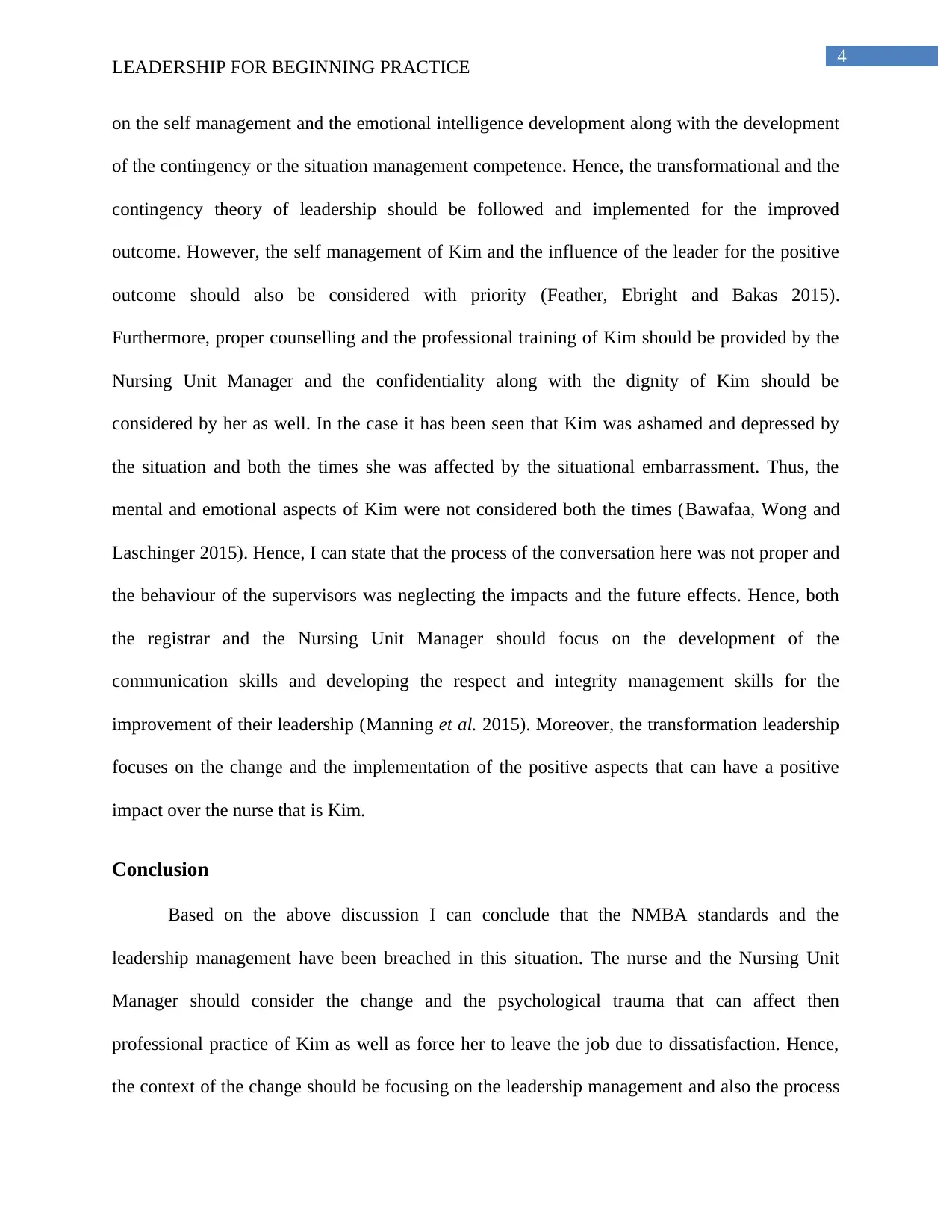
4
LEADERSHIP FOR BEGINNING PRACTICE
on the self management and the emotional intelligence development along with the development
of the contingency or the situation management competence. Hence, the transformational and the
contingency theory of leadership should be followed and implemented for the improved
outcome. However, the self management of Kim and the influence of the leader for the positive
outcome should also be considered with priority (Feather, Ebright and Bakas 2015).
Furthermore, proper counselling and the professional training of Kim should be provided by the
Nursing Unit Manager and the confidentiality along with the dignity of Kim should be
considered by her as well. In the case it has been seen that Kim was ashamed and depressed by
the situation and both the times she was affected by the situational embarrassment. Thus, the
mental and emotional aspects of Kim were not considered both the times (Bawafaa, Wong and
Laschinger 2015). Hence, I can state that the process of the conversation here was not proper and
the behaviour of the supervisors was neglecting the impacts and the future effects. Hence, both
the registrar and the Nursing Unit Manager should focus on the development of the
communication skills and developing the respect and integrity management skills for the
improvement of their leadership (Manning et al. 2015). Moreover, the transformation leadership
focuses on the change and the implementation of the positive aspects that can have a positive
impact over the nurse that is Kim.
Conclusion
Based on the above discussion I can conclude that the NMBA standards and the
leadership management have been breached in this situation. The nurse and the Nursing Unit
Manager should consider the change and the psychological trauma that can affect then
professional practice of Kim as well as force her to leave the job due to dissatisfaction. Hence,
the context of the change should be focusing on the leadership management and also the process
LEADERSHIP FOR BEGINNING PRACTICE
on the self management and the emotional intelligence development along with the development
of the contingency or the situation management competence. Hence, the transformational and the
contingency theory of leadership should be followed and implemented for the improved
outcome. However, the self management of Kim and the influence of the leader for the positive
outcome should also be considered with priority (Feather, Ebright and Bakas 2015).
Furthermore, proper counselling and the professional training of Kim should be provided by the
Nursing Unit Manager and the confidentiality along with the dignity of Kim should be
considered by her as well. In the case it has been seen that Kim was ashamed and depressed by
the situation and both the times she was affected by the situational embarrassment. Thus, the
mental and emotional aspects of Kim were not considered both the times (Bawafaa, Wong and
Laschinger 2015). Hence, I can state that the process of the conversation here was not proper and
the behaviour of the supervisors was neglecting the impacts and the future effects. Hence, both
the registrar and the Nursing Unit Manager should focus on the development of the
communication skills and developing the respect and integrity management skills for the
improvement of their leadership (Manning et al. 2015). Moreover, the transformation leadership
focuses on the change and the implementation of the positive aspects that can have a positive
impact over the nurse that is Kim.
Conclusion
Based on the above discussion I can conclude that the NMBA standards and the
leadership management have been breached in this situation. The nurse and the Nursing Unit
Manager should consider the change and the psychological trauma that can affect then
professional practice of Kim as well as force her to leave the job due to dissatisfaction. Hence,
the context of the change should be focusing on the leadership management and also the process
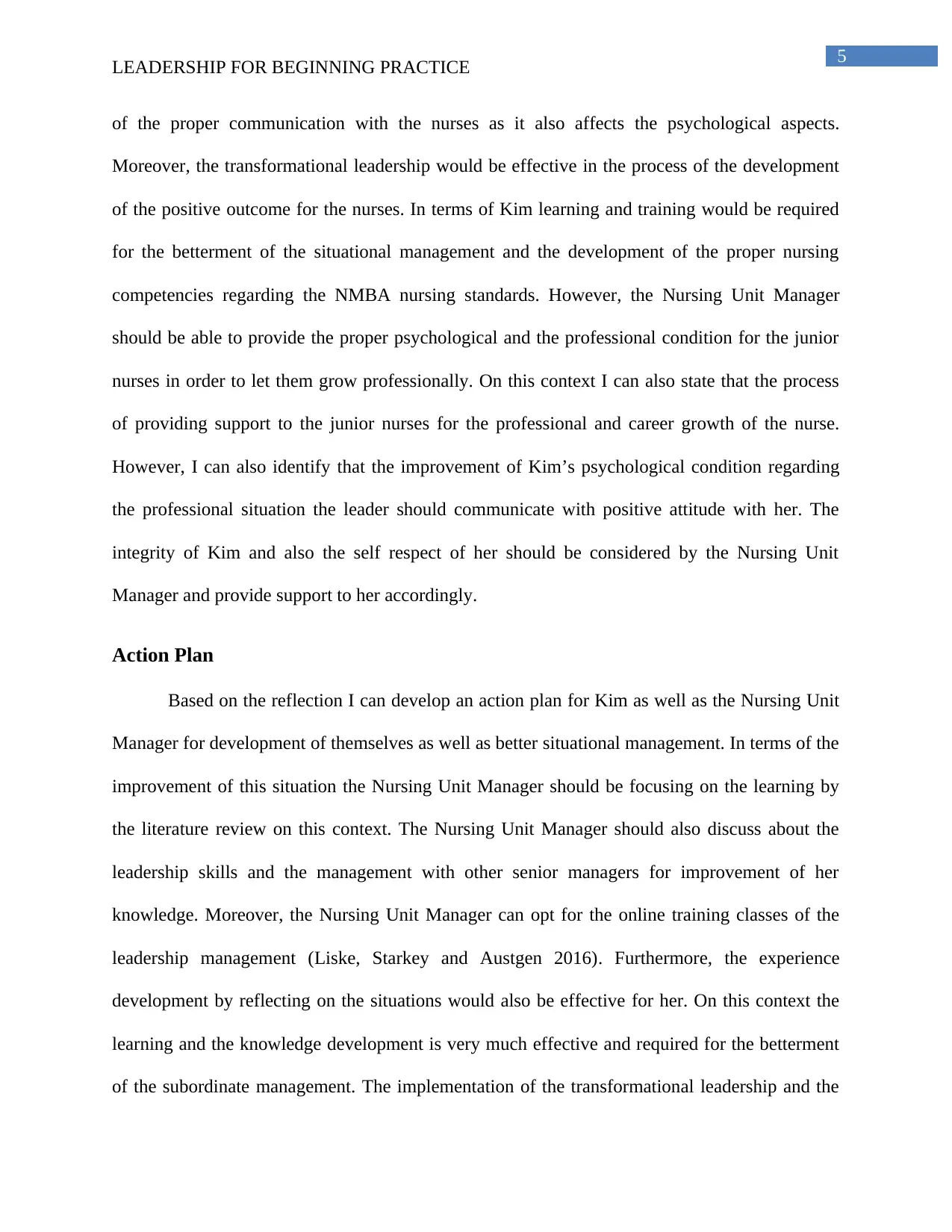
5
LEADERSHIP FOR BEGINNING PRACTICE
of the proper communication with the nurses as it also affects the psychological aspects.
Moreover, the transformational leadership would be effective in the process of the development
of the positive outcome for the nurses. In terms of Kim learning and training would be required
for the betterment of the situational management and the development of the proper nursing
competencies regarding the NMBA nursing standards. However, the Nursing Unit Manager
should be able to provide the proper psychological and the professional condition for the junior
nurses in order to let them grow professionally. On this context I can also state that the process
of providing support to the junior nurses for the professional and career growth of the nurse.
However, I can also identify that the improvement of Kim’s psychological condition regarding
the professional situation the leader should communicate with positive attitude with her. The
integrity of Kim and also the self respect of her should be considered by the Nursing Unit
Manager and provide support to her accordingly.
Action Plan
Based on the reflection I can develop an action plan for Kim as well as the Nursing Unit
Manager for development of themselves as well as better situational management. In terms of the
improvement of this situation the Nursing Unit Manager should be focusing on the learning by
the literature review on this context. The Nursing Unit Manager should also discuss about the
leadership skills and the management with other senior managers for improvement of her
knowledge. Moreover, the Nursing Unit Manager can opt for the online training classes of the
leadership management (Liske, Starkey and Austgen 2016). Furthermore, the experience
development by reflecting on the situations would also be effective for her. On this context the
learning and the knowledge development is very much effective and required for the betterment
of the subordinate management. The implementation of the transformational leadership and the
LEADERSHIP FOR BEGINNING PRACTICE
of the proper communication with the nurses as it also affects the psychological aspects.
Moreover, the transformational leadership would be effective in the process of the development
of the positive outcome for the nurses. In terms of Kim learning and training would be required
for the betterment of the situational management and the development of the proper nursing
competencies regarding the NMBA nursing standards. However, the Nursing Unit Manager
should be able to provide the proper psychological and the professional condition for the junior
nurses in order to let them grow professionally. On this context I can also state that the process
of providing support to the junior nurses for the professional and career growth of the nurse.
However, I can also identify that the improvement of Kim’s psychological condition regarding
the professional situation the leader should communicate with positive attitude with her. The
integrity of Kim and also the self respect of her should be considered by the Nursing Unit
Manager and provide support to her accordingly.
Action Plan
Based on the reflection I can develop an action plan for Kim as well as the Nursing Unit
Manager for development of themselves as well as better situational management. In terms of the
improvement of this situation the Nursing Unit Manager should be focusing on the learning by
the literature review on this context. The Nursing Unit Manager should also discuss about the
leadership skills and the management with other senior managers for improvement of her
knowledge. Moreover, the Nursing Unit Manager can opt for the online training classes of the
leadership management (Liske, Starkey and Austgen 2016). Furthermore, the experience
development by reflecting on the situations would also be effective for her. On this context the
learning and the knowledge development is very much effective and required for the betterment
of the subordinate management. The implementation of the transformational leadership and the
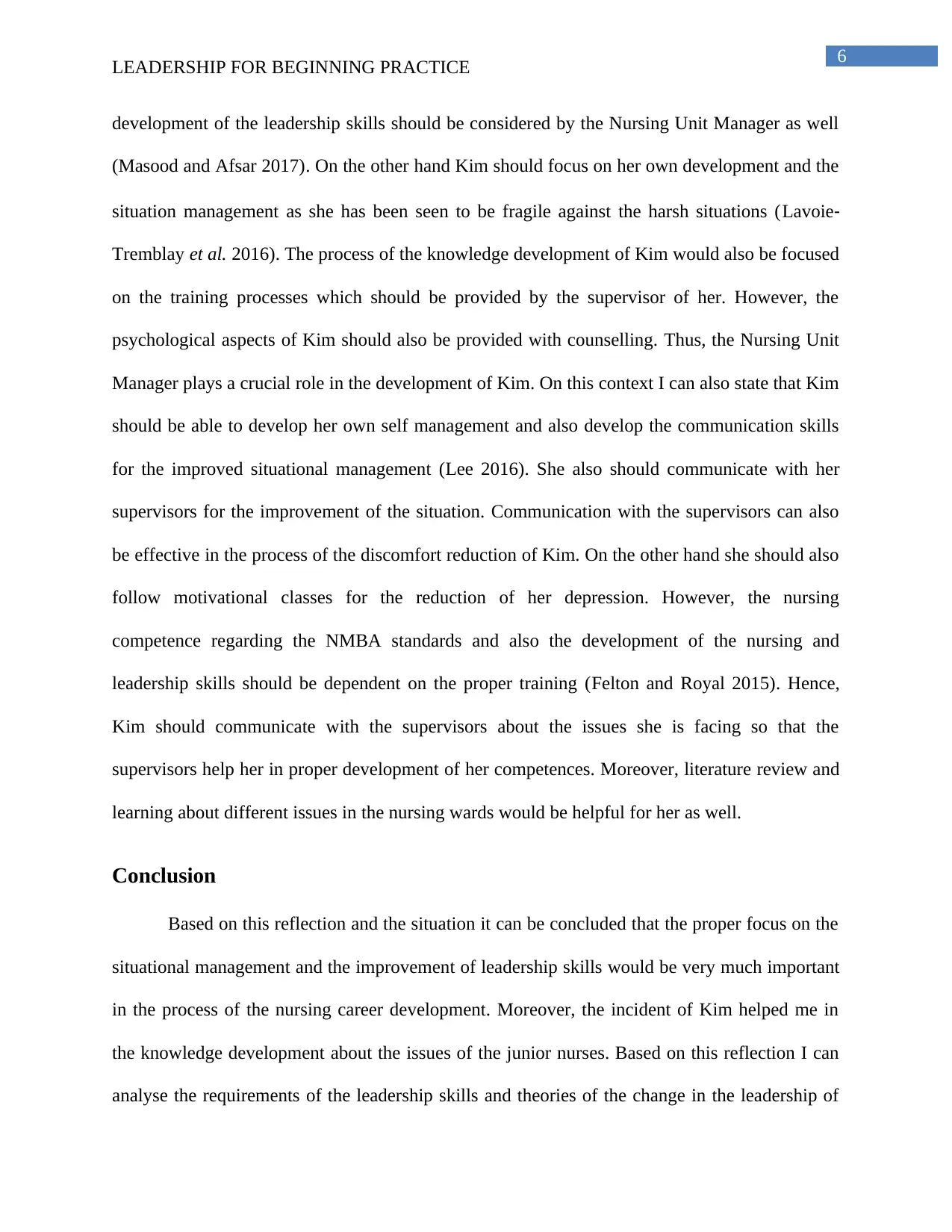
6
LEADERSHIP FOR BEGINNING PRACTICE
development of the leadership skills should be considered by the Nursing Unit Manager as well
(Masood and Afsar 2017). On the other hand Kim should focus on her own development and the
situation management as she has been seen to be fragile against the harsh situations (Lavoie‐
Tremblay et al. 2016). The process of the knowledge development of Kim would also be focused
on the training processes which should be provided by the supervisor of her. However, the
psychological aspects of Kim should also be provided with counselling. Thus, the Nursing Unit
Manager plays a crucial role in the development of Kim. On this context I can also state that Kim
should be able to develop her own self management and also develop the communication skills
for the improved situational management (Lee 2016). She also should communicate with her
supervisors for the improvement of the situation. Communication with the supervisors can also
be effective in the process of the discomfort reduction of Kim. On the other hand she should also
follow motivational classes for the reduction of her depression. However, the nursing
competence regarding the NMBA standards and also the development of the nursing and
leadership skills should be dependent on the proper training (Felton and Royal 2015). Hence,
Kim should communicate with the supervisors about the issues she is facing so that the
supervisors help her in proper development of her competences. Moreover, literature review and
learning about different issues in the nursing wards would be helpful for her as well.
Conclusion
Based on this reflection and the situation it can be concluded that the proper focus on the
situational management and the improvement of leadership skills would be very much important
in the process of the nursing career development. Moreover, the incident of Kim helped me in
the knowledge development about the issues of the junior nurses. Based on this reflection I can
analyse the requirements of the leadership skills and theories of the change in the leadership of
LEADERSHIP FOR BEGINNING PRACTICE
development of the leadership skills should be considered by the Nursing Unit Manager as well
(Masood and Afsar 2017). On the other hand Kim should focus on her own development and the
situation management as she has been seen to be fragile against the harsh situations (Lavoie‐
Tremblay et al. 2016). The process of the knowledge development of Kim would also be focused
on the training processes which should be provided by the supervisor of her. However, the
psychological aspects of Kim should also be provided with counselling. Thus, the Nursing Unit
Manager plays a crucial role in the development of Kim. On this context I can also state that Kim
should be able to develop her own self management and also develop the communication skills
for the improved situational management (Lee 2016). She also should communicate with her
supervisors for the improvement of the situation. Communication with the supervisors can also
be effective in the process of the discomfort reduction of Kim. On the other hand she should also
follow motivational classes for the reduction of her depression. However, the nursing
competence regarding the NMBA standards and also the development of the nursing and
leadership skills should be dependent on the proper training (Felton and Royal 2015). Hence,
Kim should communicate with the supervisors about the issues she is facing so that the
supervisors help her in proper development of her competences. Moreover, literature review and
learning about different issues in the nursing wards would be helpful for her as well.
Conclusion
Based on this reflection and the situation it can be concluded that the proper focus on the
situational management and the improvement of leadership skills would be very much important
in the process of the nursing career development. Moreover, the incident of Kim helped me in
the knowledge development about the issues of the junior nurses. Based on this reflection I can
analyse the requirements of the leadership skills and theories of the change in the leadership of
Paraphrase This Document
Need a fresh take? Get an instant paraphrase of this document with our AI Paraphraser
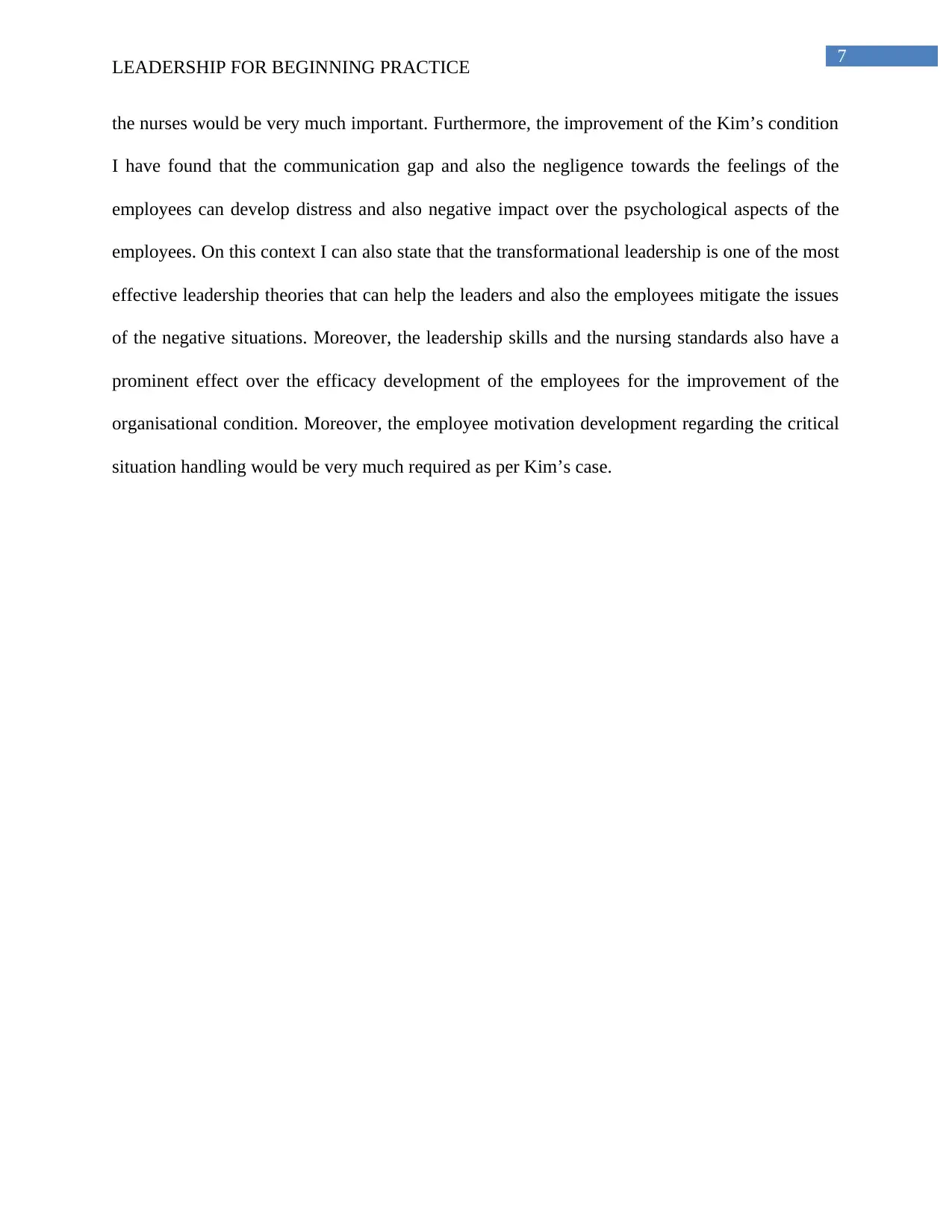
7
LEADERSHIP FOR BEGINNING PRACTICE
the nurses would be very much important. Furthermore, the improvement of the Kim’s condition
I have found that the communication gap and also the negligence towards the feelings of the
employees can develop distress and also negative impact over the psychological aspects of the
employees. On this context I can also state that the transformational leadership is one of the most
effective leadership theories that can help the leaders and also the employees mitigate the issues
of the negative situations. Moreover, the leadership skills and the nursing standards also have a
prominent effect over the efficacy development of the employees for the improvement of the
organisational condition. Moreover, the employee motivation development regarding the critical
situation handling would be very much required as per Kim’s case.
LEADERSHIP FOR BEGINNING PRACTICE
the nurses would be very much important. Furthermore, the improvement of the Kim’s condition
I have found that the communication gap and also the negligence towards the feelings of the
employees can develop distress and also negative impact over the psychological aspects of the
employees. On this context I can also state that the transformational leadership is one of the most
effective leadership theories that can help the leaders and also the employees mitigate the issues
of the negative situations. Moreover, the leadership skills and the nursing standards also have a
prominent effect over the efficacy development of the employees for the improvement of the
organisational condition. Moreover, the employee motivation development regarding the critical
situation handling would be very much required as per Kim’s case.
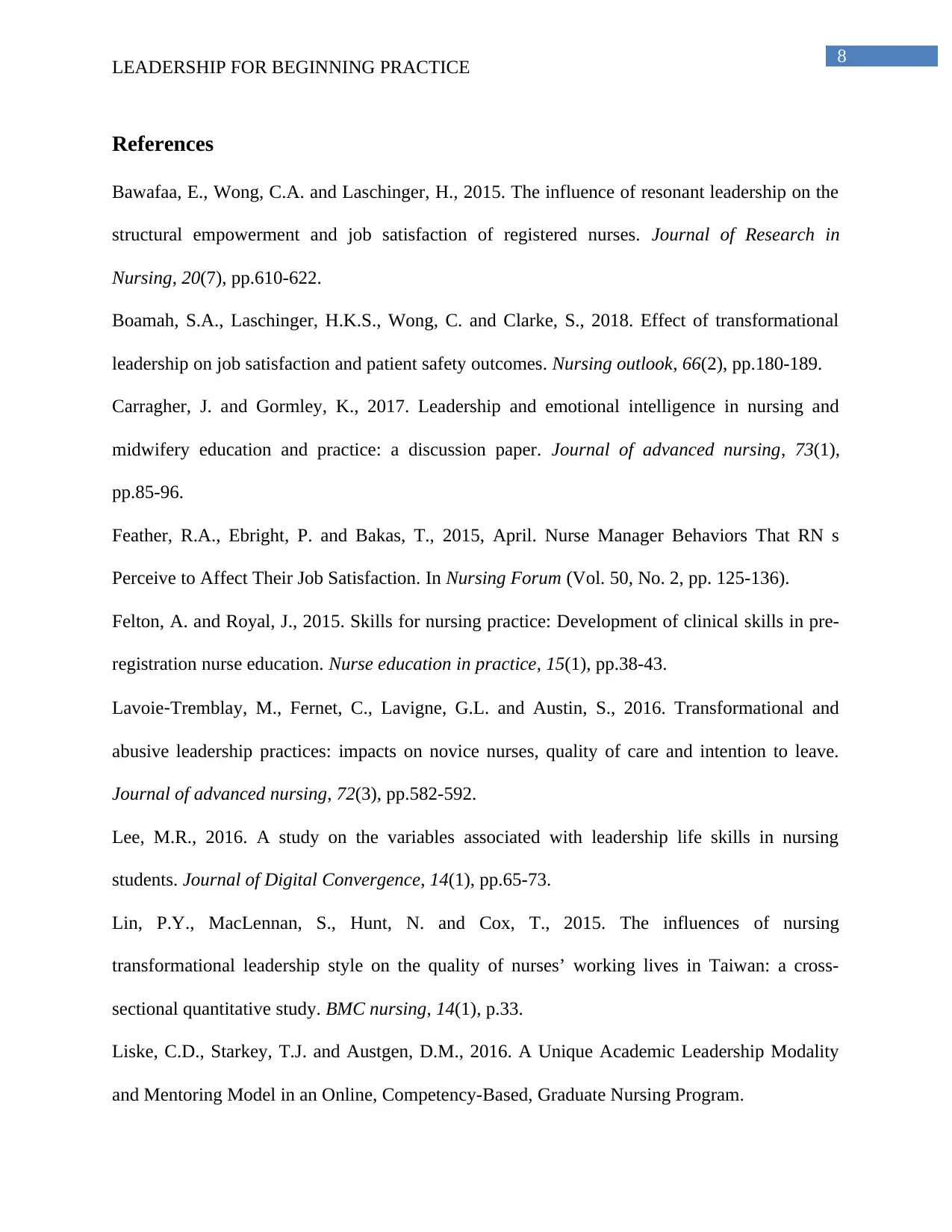
8
LEADERSHIP FOR BEGINNING PRACTICE
References
Bawafaa, E., Wong, C.A. and Laschinger, H., 2015. The influence of resonant leadership on the
structural empowerment and job satisfaction of registered nurses. Journal of Research in
Nursing, 20(7), pp.610-622.
Boamah, S.A., Laschinger, H.K.S., Wong, C. and Clarke, S., 2018. Effect of transformational
leadership on job satisfaction and patient safety outcomes. Nursing outlook, 66(2), pp.180-189.
Carragher, J. and Gormley, K., 2017. Leadership and emotional intelligence in nursing and
midwifery education and practice: a discussion paper. Journal of advanced nursing, 73(1),
pp.85-96.
Feather, R.A., Ebright, P. and Bakas, T., 2015, April. Nurse Manager Behaviors That RN s
Perceive to Affect Their Job Satisfaction. In Nursing Forum (Vol. 50, No. 2, pp. 125-136).
Felton, A. and Royal, J., 2015. Skills for nursing practice: Development of clinical skills in pre-
registration nurse education. Nurse education in practice, 15(1), pp.38-43.
Lavoie‐Tremblay, M., Fernet, C., Lavigne, G.L. and Austin, S., 2016. Transformational and
abusive leadership practices: impacts on novice nurses, quality of care and intention to leave.
Journal of advanced nursing, 72(3), pp.582-592.
Lee, M.R., 2016. A study on the variables associated with leadership life skills in nursing
students. Journal of Digital Convergence, 14(1), pp.65-73.
Lin, P.Y., MacLennan, S., Hunt, N. and Cox, T., 2015. The influences of nursing
transformational leadership style on the quality of nurses’ working lives in Taiwan: a cross-
sectional quantitative study. BMC nursing, 14(1), p.33.
Liske, C.D., Starkey, T.J. and Austgen, D.M., 2016. A Unique Academic Leadership Modality
and Mentoring Model in an Online, Competency-Based, Graduate Nursing Program.
LEADERSHIP FOR BEGINNING PRACTICE
References
Bawafaa, E., Wong, C.A. and Laschinger, H., 2015. The influence of resonant leadership on the
structural empowerment and job satisfaction of registered nurses. Journal of Research in
Nursing, 20(7), pp.610-622.
Boamah, S.A., Laschinger, H.K.S., Wong, C. and Clarke, S., 2018. Effect of transformational
leadership on job satisfaction and patient safety outcomes. Nursing outlook, 66(2), pp.180-189.
Carragher, J. and Gormley, K., 2017. Leadership and emotional intelligence in nursing and
midwifery education and practice: a discussion paper. Journal of advanced nursing, 73(1),
pp.85-96.
Feather, R.A., Ebright, P. and Bakas, T., 2015, April. Nurse Manager Behaviors That RN s
Perceive to Affect Their Job Satisfaction. In Nursing Forum (Vol. 50, No. 2, pp. 125-136).
Felton, A. and Royal, J., 2015. Skills for nursing practice: Development of clinical skills in pre-
registration nurse education. Nurse education in practice, 15(1), pp.38-43.
Lavoie‐Tremblay, M., Fernet, C., Lavigne, G.L. and Austin, S., 2016. Transformational and
abusive leadership practices: impacts on novice nurses, quality of care and intention to leave.
Journal of advanced nursing, 72(3), pp.582-592.
Lee, M.R., 2016. A study on the variables associated with leadership life skills in nursing
students. Journal of Digital Convergence, 14(1), pp.65-73.
Lin, P.Y., MacLennan, S., Hunt, N. and Cox, T., 2015. The influences of nursing
transformational leadership style on the quality of nurses’ working lives in Taiwan: a cross-
sectional quantitative study. BMC nursing, 14(1), p.33.
Liske, C.D., Starkey, T.J. and Austgen, D.M., 2016. A Unique Academic Leadership Modality
and Mentoring Model in an Online, Competency-Based, Graduate Nursing Program.
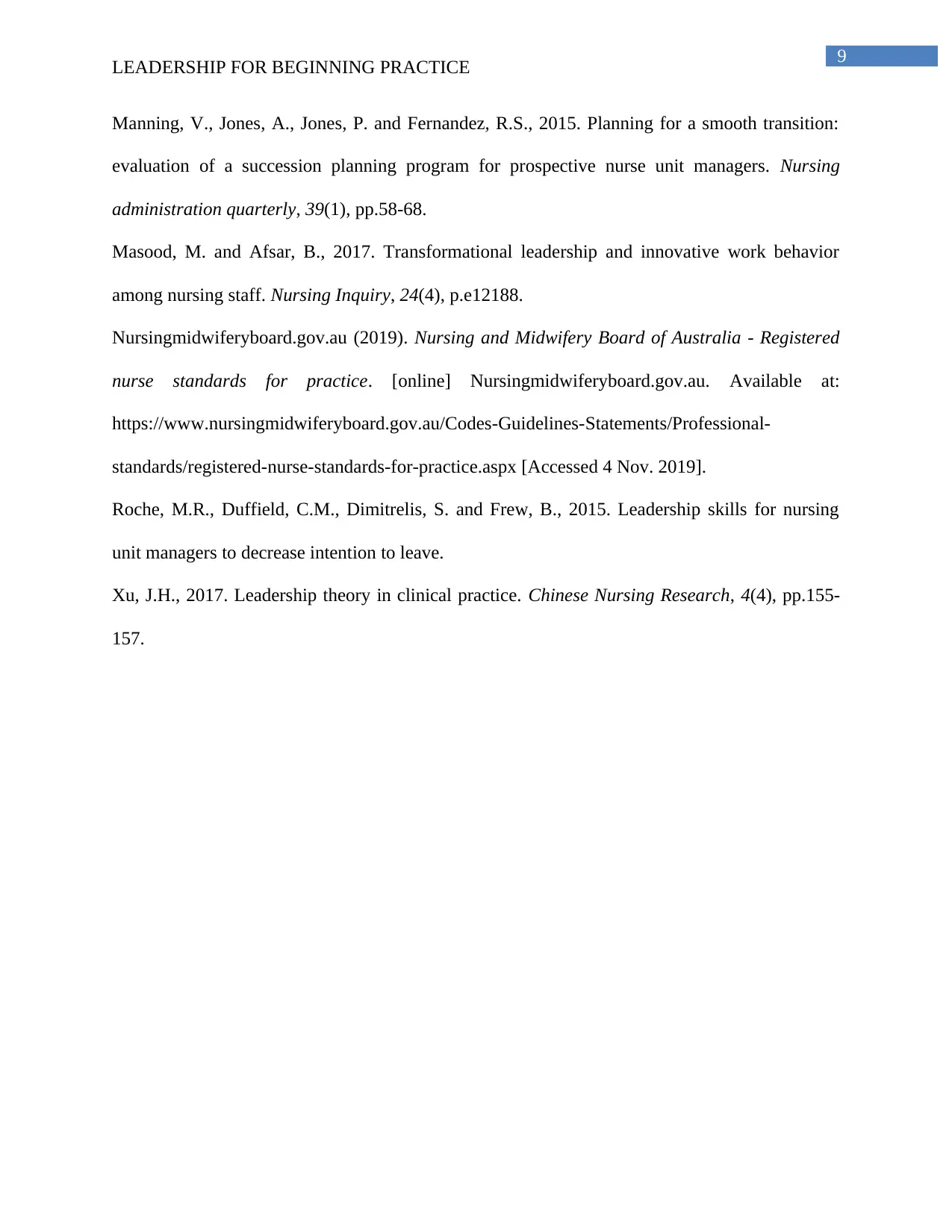
9
LEADERSHIP FOR BEGINNING PRACTICE
Manning, V., Jones, A., Jones, P. and Fernandez, R.S., 2015. Planning for a smooth transition:
evaluation of a succession planning program for prospective nurse unit managers. Nursing
administration quarterly, 39(1), pp.58-68.
Masood, M. and Afsar, B., 2017. Transformational leadership and innovative work behavior
among nursing staff. Nursing Inquiry, 24(4), p.e12188.
Nursingmidwiferyboard.gov.au (2019). Nursing and Midwifery Board of Australia - Registered
nurse standards for practice. [online] Nursingmidwiferyboard.gov.au. Available at:
https://www.nursingmidwiferyboard.gov.au/Codes-Guidelines-Statements/Professional-
standards/registered-nurse-standards-for-practice.aspx [Accessed 4 Nov. 2019].
Roche, M.R., Duffield, C.M., Dimitrelis, S. and Frew, B., 2015. Leadership skills for nursing
unit managers to decrease intention to leave.
Xu, J.H., 2017. Leadership theory in clinical practice. Chinese Nursing Research, 4(4), pp.155-
157.
LEADERSHIP FOR BEGINNING PRACTICE
Manning, V., Jones, A., Jones, P. and Fernandez, R.S., 2015. Planning for a smooth transition:
evaluation of a succession planning program for prospective nurse unit managers. Nursing
administration quarterly, 39(1), pp.58-68.
Masood, M. and Afsar, B., 2017. Transformational leadership and innovative work behavior
among nursing staff. Nursing Inquiry, 24(4), p.e12188.
Nursingmidwiferyboard.gov.au (2019). Nursing and Midwifery Board of Australia - Registered
nurse standards for practice. [online] Nursingmidwiferyboard.gov.au. Available at:
https://www.nursingmidwiferyboard.gov.au/Codes-Guidelines-Statements/Professional-
standards/registered-nurse-standards-for-practice.aspx [Accessed 4 Nov. 2019].
Roche, M.R., Duffield, C.M., Dimitrelis, S. and Frew, B., 2015. Leadership skills for nursing
unit managers to decrease intention to leave.
Xu, J.H., 2017. Leadership theory in clinical practice. Chinese Nursing Research, 4(4), pp.155-
157.
1 out of 10
Related Documents
Your All-in-One AI-Powered Toolkit for Academic Success.
+13062052269
info@desklib.com
Available 24*7 on WhatsApp / Email
![[object Object]](/_next/static/media/star-bottom.7253800d.svg)
Unlock your academic potential
© 2024 | Zucol Services PVT LTD | All rights reserved.





